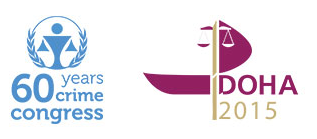Participants unanimously adopted the Doha Declaration at the 13th UN Congress on Crime Prevention and Criminal Justice, stressing justice for all as critical to the success of the post-2015 development agenda and to fighting criminal activities, terrorism and violence around the world.
It makes recommendations that will be submitted to the UN Commission on Crime Prevention and Criminal Justice, which will convene in May 2015.
 19 April 2015: Participants unanimously adopted the Doha Declaration at the 13th UN Congress on Crime Prevention and Criminal Justice, stressing justice for all as critical to the success of the post-2015 development agenda and to fighting criminal activities, terrorism and violence globally. In addition to making recommendations to be submitted to the UN Commission on Crime Prevention and Criminal Justice convening in May 2015, the Congress lent special focus to the issues of wildlife and forest crime.
19 April 2015: Participants unanimously adopted the Doha Declaration at the 13th UN Congress on Crime Prevention and Criminal Justice, stressing justice for all as critical to the success of the post-2015 development agenda and to fighting criminal activities, terrorism and violence globally. In addition to making recommendations to be submitted to the UN Commission on Crime Prevention and Criminal Justice convening in May 2015, the Congress lent special focus to the issues of wildlife and forest crime.
The Declaration: calls for fighting transnational organized crime and strengthening crime prevention and criminal justice systems; commits Member States to comprehensive, holistic approaches to addressing all forms of corruption, crime, violence and terrorism; and outlines commitments on specific actions, such as mainstreaming gender and youth-related concerns into criminal justice efforts, and addressing corruption and enhancing transparency in public administration. “The challenge we all face now is turning this declaration into action,” and concrete, tangible results, said UN Office on Drugs and Crime (UNODC) Executive Director, Yury Fedotov, in closing remarks.
In his keynote address to the Congress, which convened under the theme, ‘Integrating crime prevention and criminal justice into the wider UN agenda to address social and economic challenges and to promote the rule of law at the national and international levels, and public participation,’ UN Secretary-General Ban Ki-moon said that the post-2015 development agenda must “reflect the centrality of the rule of law” in order to be successful. He called for legal frameworks that promote: development, equality and human rights; access to justice for all; and fair criminal justice systems and effective, accountable institutions. He also stressed the “severe threat” to wildlife, noting poachers slaughtered more than 1,200 rhinos in South Africa last year.
The high-level event, ‘Wildlife and Forest Crime: A Serious Crime,’ further highlighted the issue of wildlife and forest crime, especially its role in corrupting supply chains, fueling violence and undermining the rule of law. Wildlife and forest crime is a particular challenge in developing countries that often lack the capacity to regulate natural resource exploitation, according to the UN, which estimates the value of illegal trade in wood-based products at US$17 billion.
John Scanlon, Convention on International Trade in Endangered Species of Wild Fauna and Flora (CITES) Secretary-General, said illegal wildlife trade is not about local subsistence poaching, but encompasses transnational organized criminal gangs, rebel militia and rogue military elements, which drive industrial-scale poaching and illegal trade for illicit offshore markets. Scanlon stressed, “the scale and nature of illegal wildlife trade have changed over recent years and so must the global response.”
Wildlife and forest crime must be treated as a serious criminal offence, Fedotov noted, observing that sentences imposed on criminal traffickers are “often inadequate – small fines, a few months imprisonment or conditional sentencing.” He recommended “guaranteeing a four-year sentence or more severe penalty” as well as addressing corruption risks and supply and demand, prioritizing the development of alternative livelihoods, tracking illegal goods to their destinations and sharing intelligence.
UN General Assembly President Sam Kutesa remarked that wildlife and forest crime have the potential “not only to devastate the environment, but also to undermine the social, political and economic well-being of societies, while generating billions of dollars for criminal gangs and sustaining their illicit activities.”
A panel on the ‘Rule of Law, Human rights and the Post-2015 Development Agenda’ addressed: the rule of law and human rights as enablers of the Sustainable Development Goals (SDGs); the importance of anchoring the SDGs in equality, human rights, rule of law and peace and security; proposed SDG 16 on peaceful and inclusive societies for sustainable development; and the inclusion of legal identity and birth registration and mechanisms to tackle corruption and bribery in the SDGs.
An event on UN assistance on the rule of law in conflict and post-conflict settings underscored the importance of the rule of law in fostering inclusive, equitable and sustainable development, building resilience, supporting transparent, accountable natural resource management, securing property and tenure rights, advancing peace, upholding human rights and generally contributing to the success of development efforts.
The Congress also addressed, inter alia: implementing the ‘UN Model strategies and practical measures on the elimination of violence against children in the field of crime prevention and criminal justice;’ combatting cybercrime; and fighting illegal trade of cultural artifacts.
The 13th UN Congress on Crime Prevention and Criminal Justice took place from 12-19 April 2015, in Doha, Qatar.[Doha Declaration] [UN Press Release 19 April] [UN Press Release 18 April] [UN Press Release 16 April] [UN Press Release 13 April] [UN Press Release 12 April] [UNODC Press Release 19 April] [UNODC Press Release 13 April] [UNGA President at Bilateral Meetings] [CITES Opening Remarks] [UNODC Executive Director Closing Statement] [UN Secretary-General Statement] [Congress Website] [CITES Webpage on Congress] [UNDP Statement 13 April] [Interview with UNODC Executive Director, 6 April]